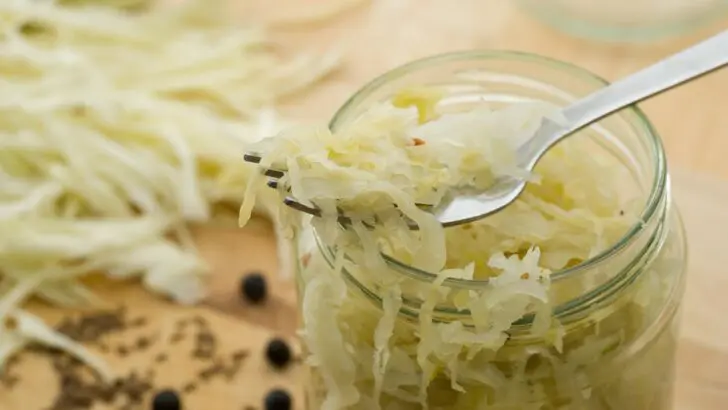Answer: Yes. Sauerkraut is made with cabbage and salt, which makes it suitable for vegans.

They said that when the world gives you cabbages, you make Sauerkraut!
One of the best national dishes in Germany, Sauerkraut is known worldwide for its versatility and health benefits.
Sauerkraut’s preparation is vegan-friendly since it only involves fermentation for several months. Its unique sour flavor results from the natural sugar fermentation of the cabbage leaves converted into lactic acid. Sauerkraut is basically pickled shredded cabbage.
Let’s learn more about Sauerkraut.
Table of Contents
What Is Sauerkraut?
Sauerkraut, meaning sour cabbage, is a popular German dish made from shredded cabbage and salt. It’s fermented for a few weeks before it’s considered fully cured.
It gives a distinctly sour taste due to the bacteria that ferment the sugars in cabbage leaves over time.
However, Sauerkraut can also be eaten after a week or two, although it’s best to leave it to ferment for three to four weeks or up to six weeks.
Fully cured Sauerkraut can last for several months, so long that it’s stored in an airtight container and stored at a room temperature of at least 60° Fahrenheit.
Refrigeration and pasteurization can also contribute to the longer shelf life of Sauerkraut.
Its origins can be dated back to the 7th century BC during the development of the Great Wall of China, from which the Tartars introduced the dish to Europe.
It’s worth noting that China also has its own pickled cabbage called Suancai.
However, other stories claim that the Romans started preserving cabbages with salt, which Roman writers Cato the Elder and Columella mentioned in their books.
The term Sauerkraut is widely used in most English-speaking countries, although some would use sour cabbage or fermented cabbage.
Other European countries use different names, such choucroute in France and zuurkool in the Netherlands.
During World War I, American manufacturers would name their Sauerkraut liberty cabbage due to fears that Americans might refuse to have it. This is because of the term Kraut, which is a German derogatory term for its people.
Sauerkraut goes well with many other dishes, including non-vegan ones. Its versatility is what makes it a go-to dish for many people.
It’s similar to Korea’s Kimchi, although it’s finely sliced while the other is cut in big sections. In some restaurants, you can find Sauerkraut being drenched in champagne.
Sauerkraut can be raw or cooked, depending on your preference.
Sauerkraut Is Vegan-Friendly
Sauerkraut is simply made with finely sliced cabbage, layered with a salt solution called brine, and kept in a jar or container for fermentation purposes.
Preparation is also easy and fast as it doesn’t involve extensive cooking, especially meat, seafood, or other non-vegan ingredients.
How to Make Homemade Sauerkraut
The preparation of Sauerkraut is as easy as making pickles or any other pickled or fermented vegetables.
It doesn’t require a cooking skill or hard-to-find ingredients as it only involves salt and fresh produce cabbages.
It also offers many health benefits, which is great for those who went vegan for health purposes. So, if you’re thinking of making Sauerkraut at home, here’s one of the easiest ways to do it.
Ingredients:
- 1 fresh medium green cabbage
- 1 1/2 tbsp. Kosher salt
- 1 tbsp. caraway seeds (optional)
What you need:
- Mixing bowl
- Canning or mason jar with cover
- Cheesecloth or any thin cloth to cover the jar
- Rubber band to secure the cloth
What to do:
- Clean everything, especially the cabbage.
- Slice the cabbage finely or thinly, and discard any limped leaves. Keep the outer leaf for covering purposes.
- Put the finely sliced cabbage in the mixing bowl, add salt, and use your hand to gently massage and squeeze them over to mix.
- Do it for five to ten minutes until the cabbage becomes limp and watery. You can also add caraway seeds if you prefer them in your Sauerkraut.
- Put the finely sliced cabbage in the mason jar and pour the liquid into it.
- Cover the mixture using the outer leaf of the cabbage to help the slices submerge into the liquid easily. Push gently.
- Cover the mason jar with the cheesecloth and secure it with a rubber band or twine. The cloth allows the air to flow freely in and out of the mason jar.
- Over time, the cabbage will rise due to the liquid as the slices become limp. Gently press or push it every few hours.
- Let it ferment for at least 10 days to six weeks at a room temperature of at least 60° to 75° Fahrenheit.
Pro Tip: When your Sauerkraut is ready to eat, don’t do it straight from the jar as it can spoil the cabbage. Use a clean spoon and cover it right away. You can also refrigerate it for its shelf life longevity.
How Healthy Is Sauerkraut?
Besides its easy preparation, Sauerkraut is also packed with health benefits, especially probiotics, which help maintain a healthy digestive system.
Here’s what you get from eating at least 100 g of Sauerkraut as per the USDA.
- Calories. 19
- Total Fat. 0.1 g
- Cholesterol. 0 mg
- Sodium. 661 mg
- Potassium. 170 mg
- Total Carbs. 4.3 g
- Protein. 0.9 g
Sauerkraut is also rich in vitamins C, K2, and B6, as well as iron, manganese, folate, calcium, magnesium, and copper.
Because of fermentation, probiotics become stronger in Sauerkraut, allowing your gut to easily absorb the vitamins and minerals in the dish.
This improves your digestion, allowing your gut flora to fight against digestive issues such as bloating, diarrhea, gas, constipation, and many more.
Eating Sauerkraut also boosts your immune system, especially since it’s rich in probiotics, which also help fight against infections like UTIs and common colds.
Because Sauerkraut is packed with probiotics, it may also help you lose weight since cabbages are low in calories and high in fiber.
Certain studies also suggest that Sauerkraut helps maintain healthy brain function and reduces stress due to its probiotics content. This helps reduce the risk of anxiety, autism, depression, and even OCD.
Moreover, eating Sauerkraut may also help fight against certain types of cancer, such as breast and prostate cancer. Cabbages are rich in antioxidants, which may aid these types of cancer.
Sauerkraut may also help promote heart health and stronger bones due to its vitamin K2 content. This lowers blood pressure and activates calcium and minerals.
On the other hand, Sauerkraut is packed with sodium, which also harms your health when consumed excessively.
Health experts recommend eating Sauerkraut at least a spoonful per day, equivalent to 10 g. Eating it in the morning is also best, although you can have it at any time of the day.
Avoid overeating Sauerkraut because its high sodium causes high blood pressure, cardiovascular diseases, and other life-threatening illnesses.
If you’re shopping for Sauerkraut, choose one that’s not pasteurized, with no added sugar and preservatives. Refrigerated ones are better because they have high probiotics compared to pasteurized Sauerkraut.
You can also rinse the Sauerkraut before eating if you want to tone down its saltiness. Otherwise, you only have to limit your daily intake to avoid any adverse health issues.
Best Vegan Sauerkraut Dishes
While Sauerkraut goes well with most dishes like meat and seafood, it also makes vegan dishes tastier and healthier.
If you love cooking, Sauerkraut vegan recipes are among the best comfort foods for those who follow a plant-based diet.
Here are some of the best Sauerkraut vegan dishes you can try at home. Recipes may vary, but most are available online, and the ingredients always come in handy.
Note that these are all vegan-friendly, so you never have to worry about the ingredients used. All these have Sauerkraut, either combined or on a side.
- Vegetable Salad
- Pancakes
- Strudel
- Soup
- Sauerkraut-Rye Bread
- Quesadilla
- Sauerkraut Patties
- Sandwich
- Vegan Mac and Cheese
- Sauerkraut Balls
- Sauerkraut Pie
- Fried Sauerkraut
Best Vegan-Friendly Sauerkraut Brands
The best Sauerkraut brands you can find in stores are labeled raw, probiotic, or live. Pasteurized Sauerkraut is likely non-beneficial to our health because it contains little to zero probiotics due to pasteurization.
So the best option is refrigerated Sauerkraut that you can find at your local grocers and supermarkets. You can also get them online such as from Amazon.
Here are four of the best Sauerkraut brands you can try.
- Hamptons Brine
- Farmhouse Culture
- Olive My Pickle
- Bubbies
The Bottom Line
Sauerkraut is vegan and healthy for everyone as it only contains cabbage and salt, which undergoes pickling.
I wrote a detailed guide about pickling in this separate article if you wanna check it out.
Nonetheless, Sauerkraut is beneficial to one’s health, although eating at least one tablespoon a day is safe since it contains high sodium levels.
If you prefer store-bought Sauerkraut, always choose the brand labeled raw, probiotic, or live, especially non-pasteurized.

